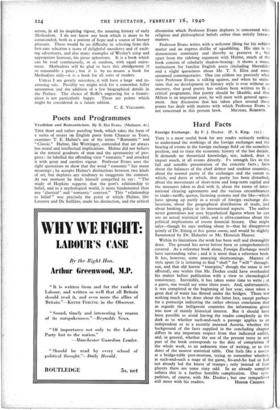Hard Facts
Foreign Exchange. By F. J. Docker. (P. S. King. z5s.).
Tins is a most useful book for any reader seriously seeking to understand the workings of the foreign exchanges and. the bearing of events in the foreign exchange field on the economic position, and to trace the economic history of the last decade. It demands no theoretical knowledge, nor, indeed, clod it impart much, at all events directly. I's strength lies in •the full and sensible presentation of the concrete facts ; facts about the balances of the chief debtor and creditor countries, about the normal parity of the exchanges and the extent to which, and dates at which, that parity has been disturbed, about the movements of short-term and long-term capital and the measures taken to deal with it, about the terms of inter- national clearing agreements and the various encumbrances to trade—tariffs, quotas, licensing systems and the like—which have sprung up partly as a result of foreign exchange dis- locations, about the geographical distribution of trade, and about banking policy in its international aspects. The author never generalises nor uses hypothetical figures where he can use an actual statistical table, and is ultra-cautious about the political implications of recent financial history. One might infer—though he says nothing about it—that he disapproves grimly of Dr. Einzig et hoc genus omne, and would be slightly flummoxed by Dr. Haberler or Mr. Heinrich Heuser.
Within its limitations the work has been well and thoroughly done. The ground has never before been so comprehensiVely covered. As a reference book alone, Foreign Exchange would have outstanding value ; and it is more than a reference book. It has, however, some annoying shortcomings. Matters of style apart (it is irritating to find "shall " for " will " through- out, and that old horror " transpire," though the sense is not affected), one wishes that Mr. Docker could have overhauled his matter before publication with a view to chronological consistency. Inevitably, it has taken some time to write ; at a guess, one would say some three years. And, unfortunately, it was completed at the beginning of last year, since when a great deal of water has flowed under the bridges. There was nothing much to be done about the latter fact, except perhaps for a postscript indicating the rather obvious conclusion that as regards the belligerent countries the information given was now of mainly historical interest. But it should have been possible to avoid leaving the reader. completely in the dark as to whether such-and-such a passage applies to an independent or to a recently annexed Austria, whether the background of the facts supplied in the concluding chapter differs in any important respect from that indicated earlier, and, in general, whether the use of the present tense in any part of the book corresponds to the date of completion of the whole work, to an unknown time of writing, or to the dates of the nearest statistical table. One feels like a novice at a bridge-table post-mortem, trying to remember whether, at such-and-such a stage of the game, So-and-So had or had 'not already led the knave of trumps ; only instead of four players there are some sixty odd. In an already complex subject this is a further horrible complication. One sym- pathises, of course, with Mr. Docker ; but one sympathises






































 Previous page
Previous page